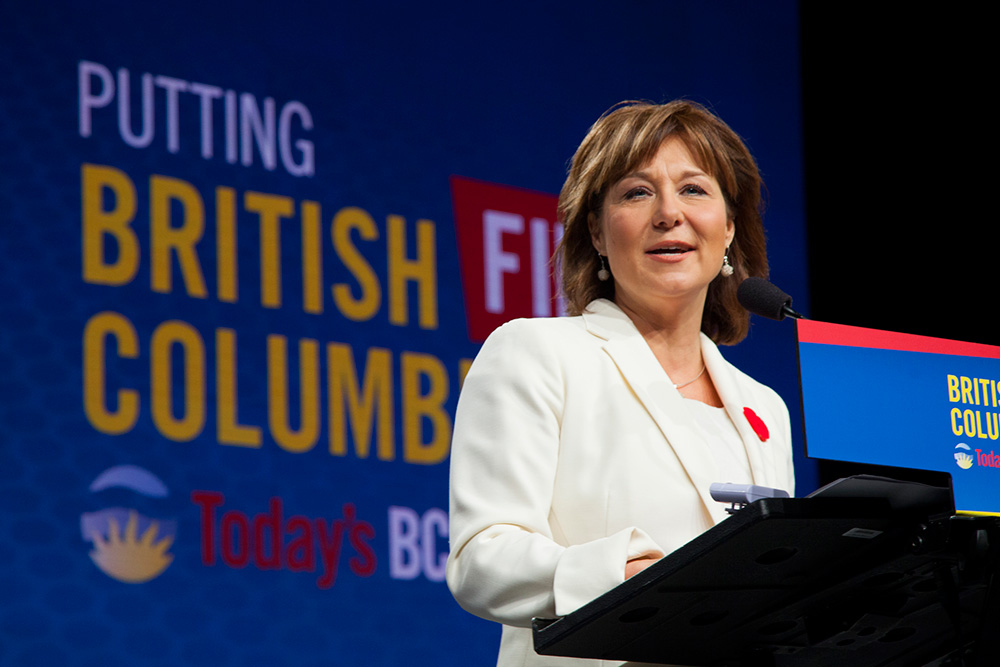Prime Minister Justin Trudeau’s announcement of plans to end private cash-for-access fundraisers federally leaves British Columbia as one of the few jurisdictions in Canada where anything goes.
Trudeau’s changes are intended to end the practice of donors paying up to $1,500 to attend events with the prime minister or cabinet ministers in private homes or other places beyond public scrutiny. From now on, such events will be in public places such as restaurants, advertised ahead of time, and open to the media.
When reporters on Friday asked B.C. Premier Christy Clark if she would follow the federal lead, she said, “Well, we’ll see how it works. I think it’s an interesting idea. So we’re watching it.”
Clark was in West Kelowna where Thursday night she hosted a private fundraising event at the Mission Hill winery. In B.C., where there are no caps on donations to political parties, the BC Liberals have reportedly sold tickets to similar events for as much as $20,000 each.
“The thing is that these are the way political fundraising has always been done in Canada,” Clark said. “We’ve always raised money in the private sector.”
The main thing is that there’s transparency around who has donated, she said, pointing to the recent BC Liberal move to report donations within 10 days of receiving them.
“Making sure that all that money is reported in real time is a very big change,” she said. “I think we’re the only province in the country that is doing that. And that may also be a change that the federal government wants to pursue as well.”
Dermod Travis, the executive director of the non-profit Integrity BC, said that regular reporting of a party’s donors does not make it possible to tell who was at a dinner or what was discussed. “We have no idea who’s there. They won’t disclose it,” he said. “It’s the privacy that makes it so sinister.”
Trudeau’s move is a positive step and it’s disappointing that Clark decided to attack him rather than follow his leadership, Travis said.
While other provinces and the federal government have moved to limit donations and stop private cash-for-access events, Clark has made B.C. even more of an outlier with its lack of limits on donations, he said.
According to Integrity BC, the federal government and five provinces have banned corporate and union donations: Alberta, Manitoba, Ontario, Quebec and Nova Scotia.
Those jurisdictions have all also capped individual donations: the federal government at $1,500, Nova Scotia at $5,000, Alberta at $4,000, Manitoba at $3,000, Ontario at $1,200 for the party, plus $1,200 to a constituency association, and Quebec at $100.
New Brunswick allows corporate and union donations, but caps all contributions at $6,000.
That leaves just the provinces of Saskatchewan, Prince Edward Island, and Newfoundland and Labrador with rules like B.C.’s where corporate and union donations are allowed and there is no cap on the amounts they or individuals may give. (While the Northwest Territories and Nunavut have donation limits, Yukon does not.)
Travis said that the largest donation in PEI in 2015 was for just over $15,000. In B.C., on the other hand, six-figure donations to the BC Liberals are common.
While Clark has defended the status quo in B.C., NDP leader John Horgan has said his party will ban corporate and union donations if it forms government. The BC Greens no longer accept donations from corporations or unions.
Though Trudeau’s announcement goes further than Clark is willing to go to restrict private cash-for-access events, the federal watchdog group Democracy Watch called it a charade, saying it wouldn’t stop the unethical influence of big money donations and calling on the federal government to match Quebec’s “world-leading” measures.

Read more: Politics

















Tyee Commenting Guidelines
Comments that violate guidelines risk being deleted, and violations may result in a temporary or permanent user ban. Maintain the spirit of good conversation to stay in the discussion.
*Please note The Tyee is not a forum for spreading misinformation about COVID-19, denying its existence or minimizing its risk to public health.
Do:
Do not: